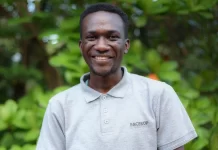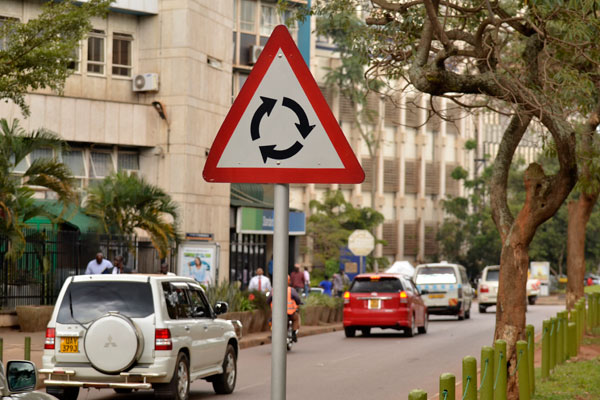While Google is using MWC to show off some of its advances in native apps on mobile devices — specifically in chat apps — the world’s biggest chat app company is doing something completely different. Facebook announced early this week that it is building a 770-kilometer (500-mile) fiber backhaul network in Uganda, in partnership with India’s Airtel and wholesale provider BCS, carriers that both have networking businesses in the country; and its Telecom Infrastructure Project is leading a call to invest $170 million into telecoms infrastructure startups.
Alongside this, the company is also making headway on its other efforts to play a bigger role in the infrastructure behind how people connect to the internet (and specifically to Facebook) through its Telecom Infrastructure Project. Facebook’s own Voyager optical networking transponder is now being deployed and tested by the carriers Telia and Orange in Europe.
Facebook said it expects the Uganda project — which will see “tens of millions of investment” from Facebook — to cover access for more than 3 million people (that’s not how many will use it, but how many can potentially be covered). As a backhaul network, the purpose will be to provide more capacity to wireless carriers’ base stations so that they can offer 3G and 4G mobile data services (in many places in the developing world, carriers still can offer no more than 2G or 2.5G).
The Voyager project, meanwhile, is one of a number of updates from the TIP, which was created by Facebook last year but (like Facebook’s other connectivity project, Internet.org) counts a number of other members — in this case, over 450, including large and small, regional carriers; equipment and software vendors like Intel and Microsoft; and more.
Other news from the TIP today included the announcement that TIP is expecting $170 million in investment into startups that are building or working on telecom infrastructure solutions. This, in my opinion, is an interesting development, considering how so much of the recent period of development in startups and their funding has been focused on software solutions.
Facebook and the TIP are not revealing too many details yet on which companies would be the recipients of this funding — we have asked and will update as we learn more — but it notes that investors that are contributing to that $170 million total include Atlantic Bridge, Capital Enterprise, Downing Ventures, Entrepreneur First, Episode 1 Ventures, IP Group plc, Oxford Sciences Innovation and Touchstone Innovations, along with other investors, incubators and institutions.
“We believe this focused investment direction from these innovative investors will bring new infrastructure solutions to the industry,” Facebook said in today’s announcement.
To be clear, this is not a fund; it’s more of a conceptual idea of how much these investors are willing to invest in startups in the area of communications infrastructure: they will have their own funds and commitments that will, in theory, get them to that total.
During a meeting at MWC, Facebook VP Jay Parikh offered .more details on how Facebook is involved. “Facebook is not actually investing in that in terms of actual money. That’s the VCs. We are lending our expertise in mentoring, we help them understand how to do hackathons, how to build out their space, we will offer any expertise we can if they decide to use our open-source hardware and software.”
He added that the company is essentially helping to bring the knowledge it gained from running its production environment at scale and its culture to these centers. “It’s more sustainable this way,” he noted.
The academic groups in the TIP will meanwhile put their emphasis on investing in university spinouts or those using university IP for comms infrastructure solutions. Some of the technologies will include stuff like smart antennas and wireless energy transfer.
To that end, there are also two new “acceleration centers” getting launched in the UK, spearheaded by BT, for carriers and Facebook to consider and deploy infrastructure solutions from startups in the field. This is on top of a first center that Facebook launched in South Korea last year with SK Telecom. You can read more about TIP’s other projects, which are largely in the very technical, piloting phase of networking technology, here.
Network connectivity, and Facebook’s “mission to connect the world,” have been longstanding side themes for the social networking company, whose bread and butter continues to be advertising on its social network, which includes Facebook, but also Messenger, WhatsApp, and Instagram.
investors_teach
Whereas Facebook usage is nearly ubiquitous in regions like North America and Western Europe, in developing markets, especially in places where the infrastructure is lacking for good internet access, it’s less used, and so Facebook’s connectivity efforts are in part a way of creating the right circumstances to attract more business.
But those efforts, while having an overtly charitable and good goal of bridging the digital divide, have had very mixed results up to now. Internet.org — the project where Facebook has partnered with several other companies to provide essentially “free” mobile internet in selected countries — backfired when it got blocked in India over net neutrality concerns (specifically that Facebook’s initiative was helping Facebook more than anyone else). It’s still managed to connect 40 million people with the initiative, which has continued to expand.
Parikh noted in today’s press conference that the company is currently focused on the Express Wifi project in India and that we should “stay tuned” for any further announcements.
And a test of its Aquila drone, a “plane” that beams down Internet access, had a crash as a result of a structural failure.
And while today’s news is about how Facebook appears to be focusing more on building the exact physical infrastructure that it has said in the past was too costly to deploy, it’s also continuing to explore further wireless options, such as this plan to offer access in Africa via satellite. That plan faced a setback when Facebook’s first satellite was destroyed when SpaceX’s rocket exploded last year. Parikh, however, believes that satellites are something the company remains to be interested in and that it is the best solution for remote areas (and potentially a complementary technology to its Aquila drone efforts).
The Internet.org situation in India shows how governments, businesses and the general public are indeed raising questions about what the full benefits or detriments are of companies like Facebook getting more involved in areas like connectivity. These are questions that will continue to be raised as Facebook provides ever-loftier presentations of its vision. Meanwhile, on a more basic level, there are ongoing questions of just how beneficial more connectivity is without a better understanding of what’s being shared. The rise of fake news, for example, coupled with freshly minted surfers, is a scary prospect.




















